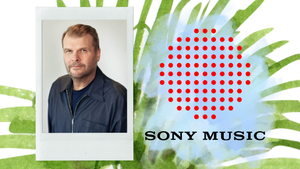TikTok should be paying more for music, as should Spotify’s subscribers. The industry needs to keep the pressure on to make sure that happens, while also capitalising on the multitude of new opportunities for artists and their music, including in AI. Although with AI, there’s still a lot to be worked out.
These were the conclusions of Sony Music chief Rob Stringer during an interview at Bloomberg’s Screentime conference last week.
Asked outright if TikTok should be paying more for the music that features in videos on its platform, Stringer conceded that the industry possibly slipped up by allowing TikTok to get itself into a position where it could play the “promo value” card to force down what it pays into the music business.
“Did we allow them to become what they think they are, which is a promotional platform?” he mused, adding, “we possibly did”. But, he insisted, “they are not a promotional platform, they are a hugely profitable corporation. We allowed them to be MTV and we shouldn't have done that”.
“So now we’re backpedaling from there”, he said of the industry’s most recent efforts to maximise the value of its TikTok deals. Though it’s not just TikTok which is underpaying, he added, alluding to other digital service providers that should be paying more.
“The truth is, we should get paid more by several of our DSP partners”, he added. “And that's part of my job, to make sure that we’re paid and in turn the artists are paid”.
With the music-specific DSPs, which already pay over 65-70% of their revenues to the industry, the problem is less the deal and more the prices they charge their customers, which impacts on what revenue is available to share. It’s no secret that the industry had been putting pressure on Spotify to increase its baseline subscription price long before that finally happened, for the first time, in summer 2023.
“Obviously they’ve done a spectacular job of building a business around music, so I would not be critical of what they’ve done”, Stringer said of Spotify. “But I think the price should have been going up a dollar a year for the last five years. They wanted to be competitive and get their share price up, and so they didn't put the price up. But we are where we are. And they’re finally putting the prices up and that’s great”.
After nearly a decade of streaming-fuelled record industry growth, Stringer’s major label competitors have been talking up another digital opportunity over the last year: super-serving superfans. After Stringer pointed out that artists have a lot more power in the music business today because they have several lucrative revenue streams beyond recordings, he was asked if Sony Music is following his rivals by getting involved in those other revenue streams, including the superfan opportunity.
Working with artists in other ways is actually more “organic for our company” than the other majors, Stringer reckoned. Because, whereas Universal Music and Warner Music were both divorced from the other Universal and Warner entertainment companies long ago, Sony Music still sits within the wider Sony entertainment business.
“We're making movies with our picture company, we’re doing games with our PlayStation company", he said, and there have been collaborations within the Sony empire around anime. “We're doing tons of stuff with anime now that I wouldn’t have necessarily thought of five years ago”.
And Sony plans to innovate in that domain as much with catalogue as with new artists. Which it kind of has to, given how much has been spent on the mega-bucks deals it has negotiated with Queen, Pink Floyd, Bruce Springsteen and the Michael Jackson estate. Two of those deals include brand and likeness rights, Stringer was keen to stress.
“There are gold mines everywhere”, he added. “For instance, we have a share of ‘MJ: The Musical’. We have a percentage with the Michael Jackson estate, as does our picture company. And that is on in five places in the world. That’s like an act touring times five and that’s quite lucrative”
“As we move into the into new eras of digital exploitation”, he went on, “we think ‘Dark Side Of The Moon’ or ‘Thriller’ or ‘Bohemian Rhapsody’ or ‘Born To Run’ are going to be experientially very exciting for generations even well beyond, certainly your generation, well beyond my generation”.
As for the AI opportunity, “do I think it’s going to be an exciting tool in the future for making great music?” Stringer mused, before answering his own question with an unequivocal “yes”.
But, right now, he added, “my team and I are sorting out the rights model, making sure that we get paid for whatever the training models are and whatever comes out of AI. I think there’s a fourteen year old in a bedroom somewhere who’s about to make amazing music using the tools of AI - but we have to get the business model sorted out first”.
That process, presumably, will ascertain to what extent AI will fuel the next phase of growth in the recorded music market, beyond pushing up streaming subscription prices, squeezing more money out of TikTok, and figuring out other ways recording artists can make money beyond their recordings.

